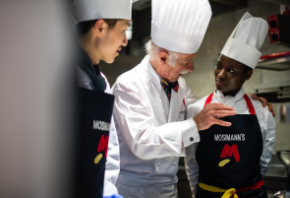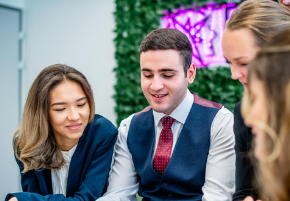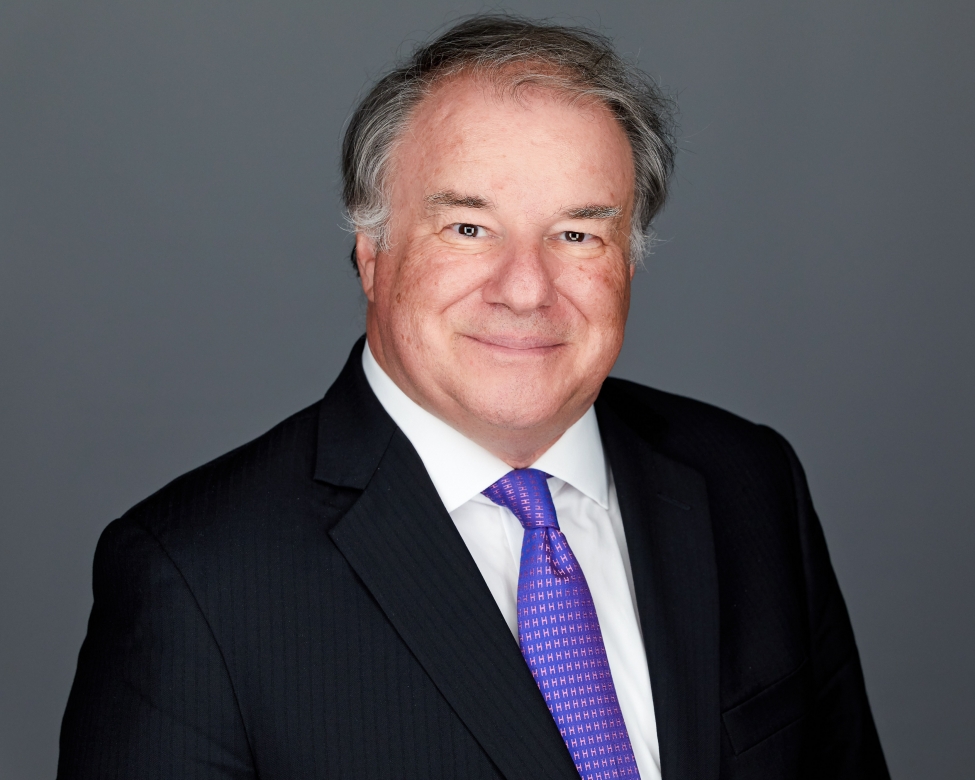- About
- Programs
- Innovation & Research
- Campus Life
- Career Services
- Admissions
- News & Events
- Alumni
Leadership is Everyone’s Business
Leadership is Everyone’s Business
What does it take to become a leader in these turbulent times? Dean of External Relations at IMD Business School and a board member at Swiss Education Group, Prof. Dominique Turpin Ph.D. weighs in – and offers an optimistic outlook for the future of hospitality
“Leadership is everyone’s business. You can be a leader in your family, you can be a leader in your sports club, your class – anybody can become a leader.”
– Prof. Dominique Turpin, Ph.D.
On social media, we need followers. In real life, we need leaders.
However, the idea of ‘leadership’ comes with so much baggage, so many misconceptions, that all too often it can seem too big, too scary, or too hard to reach. People shy away, too afraid to put themselves forward, to risk rejection or ridicule. What if no one listens? What if I’m hated for it? What if I’m not leadership material? After all, with great power, comes great responsibility.
Over the last 18 months, as the world has changed almost beyond recognition, we’ve never needed leaders more. Every person, every industry, every corner of the globe was touched by the pandemic, and whether those leaders were in the classroom, the boardroom or the houses of parliament, we called on them to light our way, to move us forward.
At Swiss Education Group, our job is to prepare our students for leadership. How do we do that? By surrounding them with exemplary leaders – with lecturers, CEOs, deans, award winners, chefs, managers, business owners and alumni, all with stories to tell and inspiration to impart.
Prof. Dominique Turpin is one of those leaders who have inspired our students.
Born in France, Prof. Turpin completed his doctoral studies in Economics in Japan before joining IMD. There, he served as President from 2010 to 2016, and currently serves as Dean of External Relations. He also sits on the boards of a number of organizations, including Swiss Education Group.
At Swiss Education Group, our job is to prepare our students for leadership. How do we do that? By surrounding them with exemplary leaders, all with stories to tell and inspiration to impart.
Impressive? Most definitely. Intimidating? Not if Prof. Turpin has anything to say about it. His humble belief is that anyone can become a leader and that we all, no matter our status or position, can learn from one another. It’s an approach to working life which he demonstrated admirably at the inaugural SEG Students Leadership Forum last June.
“It was a such a good experience, not just for the students, but for me too,” he recalls. “It was a rare opportunity for me to reflect on my career. When I first joined IMD, I was a young professor. I was 29, and probably the average age in faculty was 50, so it was a bit daunting. There were certain questions that I didn’t dare ask.
"If I had to do it all over again, I would try to be a little more daring, but, having said that, it’s also up to the leaders to create that safe environment, where people can ask questions without running the risk of being seen as too naive or, or not bright enough. It’s always better to engage in dialogue rather than a monologue. As someone said: a monologue is not a discussion.”
So, what makes a good leader?
“Number one, is courage,” he stresses. “Courage to take very difficult decisions, especially in this very volatile, uncertain, and complex world. To me, that’s vital. Number two, you need to have a sense of humility, simply because we don’t always have all the answers. Number three, it’s about being flexible, being adaptive. When the situation is constantly changing, as it is now thanks to the pandemic, you need to be able to be agile, and for your company or organization to be agile, too.”
For Prof. Turpin, having a sense of vision is also key. “For me, leaders must be pathologically optimistic people,” he says. “Particularly during these challenging times, we need to offer direction, a way forward. You cannot say: I’m sorry, but I don’t know where we’re going, I don’t know what we’re doing. We need to have a plan, for the mid-term, the long-term, even if we don’t know how the world is going to look next week or next month.”
For me, leaders must be pathologically optimistic people. Particularly during these challenging times, we need to offer direction, a way forward.
“Lastly, leaders must have an understanding of the importance of engagement and communication,” he continues. “The world is so different now – digitalization has revolutionized everything. Take the travel industry, for instance. Ten years ago, you had leaders like TUI, and now you see companies like Booking.com – the top three operate from digital platforms that didn’t even exist a couple of decades ago.
“So, you need to have the tools and the knowledge to engage effectively with new generations, who might have a different experience of the world, an increasingly digital one.
“I think that many companies today are struggling with diversity. Diversity has become a kind of buzzword, but it’s so much more than that. It’s not just about keeping a balance between the influence that men and women can have, or the representation of minorities, it’s also about engaging with different generations. Different generations can bring different skills, different ideas to companies.”
But what happens when you don’t have that clear sense of direction? How do you develop your own vision, for your life and career, especially when you’re just starting your higher education journey? For Professor Turpin, it all boils down to one thing: self-confidence.
“This is what will help you to make the right decisions in your life,” he says. “And the education that the Swiss Education Group provides, in its different school curriculums, enables students to build that self-confidence. At this stage in life, you have the opportunity to experiment, to get things wrong — but you need to have the space to do that. Swiss Education Group's schools offer that to their students.”
“I see a lot of young people, who are starting to embrace a career in university, many of whom still don’t know what exactly they want to do. Some choose to tackle their indecision by deliberately picking a discipline which is broad enough in order to provide them with a lot of different opportunities. It is a good strategy.
At this stage in life, you have the opportunity to experiment, to get things wrong — but you need to have the space to do that. Swiss Education Group's schools offer that to their students.
“I actually think that hospitality fits neatly into that. It’s not just about hotels and restaurants anymore – it is a business education with a service mindset. Hospitality opens many doors. And I’m convinced that, as soon as the global travel restrictions are lifted, we’ll see a boom. People will want to travel. I have no doubt that the hospitality industry will flourish.”
And while you may not always be ready for everything life throws at you (we’re looking at you, coronavirus), the one thing you can control is your attitude, stresses Professor Turpin.
“As I once heard somebody say, attitude defines your altitude,” he concludes. “It’s the number one priority for us, when recruiting people – that mentality, that willingness to go above and beyond. That will take you far.”
And where you lead, others will follow.
Want to know more? Download our brochure and find out more about Swiss Education Group's programs!
#Corporate News



















